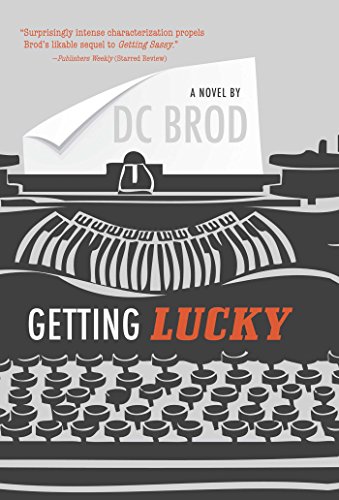Getting Lucky

“Ms. Brod’s writing is smooth and the subplots about her mom and the protagonist’s relationship differences are handled with care and thoughtfulness. Unfortunately, these two qualities do not move the story forward without the action necessary to suck the reader into a plausible and interesting plot—and that’s the main job of a writer.”
Fortyish freelance writer Robyn Guthrie, a reporter, is a likeable heroine dealing with the ups and downs of modern life in Fowler, Illinois, outside of Chicago.
Lizzie, Robyn’s aging mother, has dementia, which is inevitably becoming more pronounced. Robyn has settled in her into a local adult assisted living facility. Amid all this turmoil, Robyn discovers she and her beau, the ex-jockey Mick Hughes, might be on opposite sides of the fence on the prospect of children.
Robyn’s professional life is not all roses, either. Clair, a reporter at the local newspaper, has been killed in a hit and run accident. When Robyn visits the scene of the crime—on the side of a highway—she wonders why Clair would walk her beloved dog Scoop in such a dangerous place on a dark and stormy night.
Robyn agrees to find a home for Scoop and finish one of stories Clair had been working on. She wants the Stella Burke story—who was arrested for running a call girl ring out of her home—but settles for the Cedar Ridge story, Fowler’s foray into green homebuilding.
The story looks like a puff piece. The homes will be made from recycled materials and financed with low interest loans, so families will able afford them—everybody benefits.
At the same time, Robyn’s mom decides she wants out of the assisted care home to buy a house with Robyn. Clearly, with Lizzie’s dementia, that would be difficult—not to mention Robyn would prefer not to live with her mother. But how many ways can you say no? Should Robyn stop bringing her mom wine (and how does that go with her medications?) and magazines until Lizzie sees reason?
The more research Robyn does on Cedar Ridge, the more tangled the story becomes. The owner is married to a high-school classmate who used to bully Clair, so meetings with Kat are nerve-wracking—even before Kat accuses Robyn of having an affair with her husband.
The plot collapses when Clair chooses to fix the problems she finds with the building’s development before writing about them for the paper. Yes, she’s a stringer, but every ink-stained wretch on the planet would write the story first. It’s a conundrum: If she were a small business owner or a dog walker, the information she gets is hers to do with as she pleases. But she’s a reporter, and got her information posing as a reporter. Her duty is to write the story for the paper, not to attempt to change the world.
Ms. Brod’s writing is smooth and the subplots about her mom and the protagonist’s relationship differences are handled with care and thoughtfulness. Unfortunately, these two qualities do not move the story forward without the action necessary to suck the reader into a plausible and interesting plot—and that’s the main job of a writer.
Maybe in the next installment of the series, Robyn will report on a story that takes advantage of D. C. Brod’s considerable writing skills.